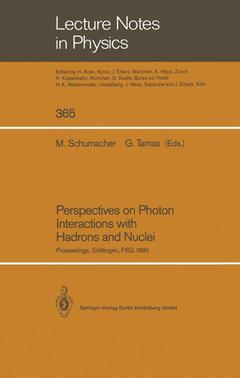Description
Perspectives on Photon Interactions with Hadrons and Nuclei, Softcover reprint of the original 1st ed. 1990
Proceedings of a Workshop Held at Göttingen, FRG on 20 and 21 February 1990
Lecture Notes in Physics Series, Vol. 365
Coordinators: Schumacher Martin, Tamas Gabriel
Language: English
Subject for Perspectives on Photon Interactions with Hadrons and Nuclei:
Keywords
Accelerator; Meson; Nuclear Physics; Particle Physics; Photon; Quark; hadron
Publication date: 08-2014
254 p. · 17x24.4 cm · Paperback
254 p. · 17x24.4 cm · Paperback
Description
/li>Contents
/li>
The topics treated in this volume are intermediate and high-energy nuclear physics with real and virtual photons and the interplay between nuclear and particle physics. The first part, devoted to vector mesons, is also intended to explore the scientific perspectives of a new generation of electron accelerators. The second part is devoted to physics currently under study at intermediate-energy real-photon facilities with some emphasis on the Compton effect and its relation to quark models.
Vector meson dominance.- Signs of vector meson dominance in the total photoabsorption cross section.- The shadowing effect in the compton scattering cross section.- The shadowing effect in deep inelastic lepton scattering.- The electromagnetic interaction of rhos.- Vector meson dominance and pointlike coupling of the photon in soft and hard processes.- Probing the short range behavior of nuclei with high PT photo- and electro-nuclear reactions.- Point-like interactions of photons in high PT photoproduction.- The Coulomb field of relativistic nuclei: An intense source of (almost) real photons.- Photon scattering as a tool for study of nucleon and nucleus structure.- Photon and pion scattering on the basis of quark models.- Pion photoproduction and Compton scattering in quark models.- Compton scattering off nucleons near threshold.- Eta photoproduction from nuclei.- Photonuclear reactions at intermediate energies.- Photonuclear reactions at intermediate energies by self-consistent RPA-SK3 continuum theory: The mean-field quasideuteron effect.- Dipole sum rule enhancement in nuclei.
© 2024 LAVOISIER S.A.S.




